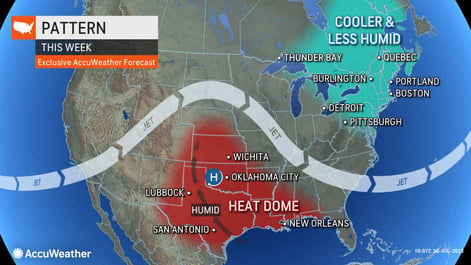UNPRECEDENTED HEAT: Businesses deal with the hottest July on record

Summary
July 2023 marked the hottest month, highlighting the challenges businesses face in extreme heat.
Key Highlights
July 2023 was the hottest in the 174 years of recorded history.
Rising temperatures put a strain on energy demands and posed challenges for providers.
Workers, including construction and warehouse employees, faced health concerns during extreme heat.
July 2023 is officially the hottest on record. Not only that, it’s also the hottest month in 174 years of recorded history, according to NASA and the National Oceanic and Atmospheric Administration. The statistics are not just numbers; they signify a significant shift in our planet's climate with significant implications for businesses.
The global average surface temperature in July 2023 soared a staggering 2.02 degrees Fahrenheit above the 20th-century average. This leap is more than just a fraction; it's a monumental shift. This heat wave shattered the previous July record by over one-third of a degree Fahrenheit, marking the first time July temperatures exceeded 1.8 degrees Fahrenheit above the long-term average.
>>READ MORE: Understanding the Causes of Extreme Heat
Business implications during unprecedented heat
Companies faced impacts during the record heat. Here are some of the challenges different industries faced with the wave of extreme heat.
Energy and Utilities: One immediate concern is the strain on energy resources. As air conditioning units work overtime, energy demands skyrocket. This strains power grids and poses challenges for energy providers. AccuWeather For Business offered insights into temperature trends and extreme heat events. This information allows energy companies to predict peak demand, allocate resources efficiently, and maintain reliable energy supplies even during the hottest days.
Agriculture: Prolonged heat waves can trigger droughts, reduce crop yields, and escalate production costs. Forecasts provided by AccuWeather For Business allowed farmers to make informed decisions about irrigation, planting and harvesting. By understanding weather patterns, agricultural businesses can adapt strategies and minimize losses caused by extreme heat events.
Construction: Construction workers, who brave the elements to build our cities and infrastructure, face heightened risks during heat waves. AccuWeather For Business alerted companies to dangerous working conditions, protecting workers’ health, leading to more effective workforce management and increased attendance.
Warehouse and Manufacturing: Workers, essential to keeping supply chains operational, are also vulnerable. Warehouses can become unbearable hotspots during heat waves, posing health risks and hampering productivity. AccuWeather For Business enabled warehouse managers to monitor temperature trends and proactively implement measures to maintain a safe working environment. By adapting schedules, providing cooling measures and optimizing workflows, businesses can ensure the safety and efficiency of their workforce.
>>READ MORE: AccuWeather introduces new index to better assess the impacts of heat waves
How AccuWeather For Business can help
Extreme heat can lead to intense heat waves that can impact energy demand, consumer buying behavior, labor scheduling and other essential tasks you manage every day. AccuWeather For Business uses enhanced techniques to produce a single historical, current and predicted weather data database to help your business achieve long-term strategic success.
Is your business prepared for the dangers of extreme heat? AccuWeather For Business Historical Data can help your business better protect your operations and employees. Download a free sample today!
Gain crucial insights to help you to navigate the challenges of sizzling temperatures by watching an on-demand version of our webinar below.








